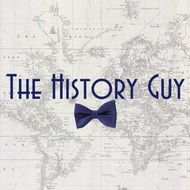
Join The History Guy from YouTube in conversation about his videos and various topics in history. Here you can find behind-the-scenes peeks of the set and The History Cats. Share ideas for future videos or ask questions of both the community and The History Guy himself. Early releases and the occasional extras are available for supporting members.
Newspapers started reporting that the eclipse was coming months beforehand, giving advice on the best places to travel to catch the “path of totality.” Scientists prepared their experiments, people prepared their travel plans, businesses prepared for a bonanza, and everyone sought a glass they could look through without going blind. And, as the event started to unfold, all the world seemed to stop their business and watch. It was eclipse mania on June 8, 1918.
No, the History Guy never owned a classic mustang. But that doesn't mean I didn’t want to.
On February 27, 1942 a three decades old US Navy ship was attacked by Japanese aircraft and sunk. It was a difficult time for the allies, many ships were lost that day. But the sinking of USS Langley represented the end of one of the most consequential ships is the Navy's history.












